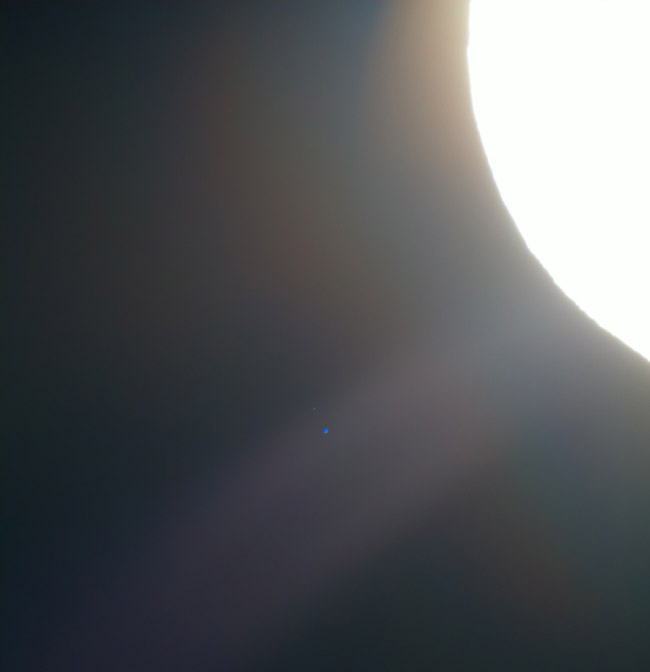Difference between revisions of "December 22, 2011"
| Line 1: | Line 1: | ||
__NOTOC__ | __NOTOC__ | ||
=Bright Blue Dot= | =Bright Blue Dot= | ||
| − | |||
<!-- ws:start:WikiTextHeadingRule:0:<h1> --> | <!-- ws:start:WikiTextHeadingRule:0:<h1> --> | ||
<!-- ws:start:WikiTextLocalImageRule:6:<img src="/file/view/LPOD-Dec22-11.jpg/288056508/LPOD-Dec22-11.jpg" alt="" title="" /> -->[[File:LPOD-Dec22-11.jpg|LPOD-Dec22-11.jpg]]<!-- ws:end:WikiTextLocalImageRule:6 --><br /> | <!-- ws:start:WikiTextLocalImageRule:6:<img src="/file/view/LPOD-Dec22-11.jpg/288056508/LPOD-Dec22-11.jpg" alt="" title="" /> -->[[File:LPOD-Dec22-11.jpg|LPOD-Dec22-11.jpg]]<!-- ws:end:WikiTextLocalImageRule:6 --><br /> | ||
| − | <em>image by [mailto:lrargerich@gmail.com Luis Argerich], Buenos Aires, Argentina.</em><br /> | + | <em>image by [mailto:lrargerich@gmail.com" rel="nofollow Luis Argerich], Buenos Aires, Argentina.</em><br /> |
<br /> | <br /> | ||
| − | When I looked at Luis' image I thought it was strange to see planets so close to the Sun, especially blue planets. And then I read the information he sent: <em>On December 9th the Moon occulted the multiple star system Tau Tauri as seen from Buenos Aires, Argentina. This photo shows the star very close to the Moon in the middle of a lunar corona. Tau Tauri is a triple star system, two components are visible in the photo, one very faint. The third component is not easy to resolve.</em> I - this is Chuck again - was surprised at the intensity of blue for the brightest component and asked Luis if Tau Tauri was a blue star. He replied, <em>Yes, it's [http://stargazerslounge.com/observing-reports/91858-brief-encounter-tau-tauri-security-light.html strikingly blue]</em>. <em>Please notice I enhanced the saturation to make the lunar corona more visible, that makes the star appear even more blue.</em><br /> | + | When I looked at Luis' image I thought it was strange to see planets so close to the Sun, especially blue planets. And then I read the information he sent: <em>On December 9th the Moon occulted the multiple star system Tau Tauri as seen from Buenos Aires, Argentina. This photo shows the star very close to the Moon in the middle of a lunar corona. Tau Tauri is a triple star system, two components are visible in the photo, one very faint. The third component is not easy to resolve.</em> I - this is Chuck again - was surprised at the intensity of blue for the brightest component and asked Luis if Tau Tauri was a blue star. He replied, <em>Yes, it's [http://stargazerslounge.com/observing-reports/91858-brief-encounter-tau-tauri-security-light.html" rel="nofollow strikingly blue]</em>. <em>Please notice I enhanced the saturation to make the lunar corona more visible, that makes the star appear even more blue.</em><br /> |
<br /> | <br /> | ||
| − | [mailto:tychocrater@yahoo.com Chuck Wood]<br /> | + | [mailto:tychocrater@yahoo.com" rel="nofollow Chuck Wood]<br /> |
<br /> | <br /> | ||
<strong>Technical Details</strong><br /> | <strong>Technical Details</strong><br /> | ||
| Line 14: | Line 13: | ||
<br /> | <br /> | ||
<strong>Related Links</strong><br /> | <strong>Related Links</strong><br /> | ||
| − | [http://en.wikipedia.org/wiki/Tau_Tauri Wikipedia] reports: Tau Tauri is a triple star system in the constellation Taurus. It is approximately 401 light years from Earth. The primary component, Tau Tauri A, is a blue-white B-type main sequence dwarf with an apparent V magnitude of +4.26. It has a close companion 0.1 arcseconds away which has a magnitude of +8.9. At a separation of 63 arcseconds is the third component of the system, Tau Tauri C, which is classified as a white A-type star and has a V magnitude of +7.10.<br /> | + | [http://en.wikipedia.org/wiki/Tau_Tauri" rel="nofollow Wikipedia] reports: Tau Tauri is a triple star system in the constellation Taurus. It is approximately 401 light years from Earth. The primary component, Tau Tauri A, is a blue-white B-type main sequence dwarf with an apparent V magnitude of +4.26. It has a close companion 0.1 arcseconds away which has a magnitude of +8.9. At a separation of 63 arcseconds is the third component of the system, Tau Tauri C, which is classified as a white A-type star and has a V magnitude of +7.10.<br /> |
<br /> | <br /> | ||
<hr /> | <hr /> | ||
Revision as of 22:25, 4 January 2015
Bright Blue Dot

image by " rel="nofollow Luis Argerich, Buenos Aires, Argentina.
When I looked at Luis' image I thought it was strange to see planets so close to the Sun, especially blue planets. And then I read the information he sent: On December 9th the Moon occulted the multiple star system Tau Tauri as seen from Buenos Aires, Argentina. This photo shows the star very close to the Moon in the middle of a lunar corona. Tau Tauri is a triple star system, two components are visible in the photo, one very faint. The third component is not easy to resolve. I - this is Chuck again - was surprised at the intensity of blue for the brightest component and asked Luis if Tau Tauri was a blue star. He replied, Yes, it's " rel="nofollow strikingly blue. Please notice I enhanced the saturation to make the lunar corona more visible, that makes the star appear even more blue.
" rel="nofollow Chuck Wood
Technical Details
2011-12-09 22:36:43. Skymaster 127mm (Maksutov-Cassegrain) + Canon T2i Afocal 1/2 ISO400.
Related Links
" rel="nofollow Wikipedia reports: Tau Tauri is a triple star system in the constellation Taurus. It is approximately 401 light years from Earth. The primary component, Tau Tauri A, is a blue-white B-type main sequence dwarf with an apparent V magnitude of +4.26. It has a close companion 0.1 arcseconds away which has a magnitude of +8.9. At a separation of 63 arcseconds is the third component of the system, Tau Tauri C, which is classified as a white A-type star and has a V magnitude of +7.10.



